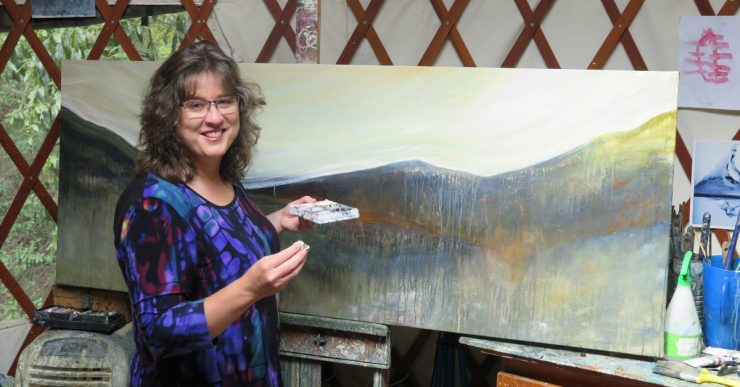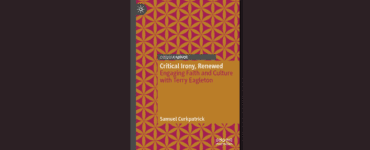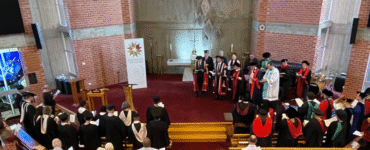We envision a just world where creative and spiritual practices work together to promote the flourishing of all creation.
I have been following the work that is being done by ARC: Arts | Religion | Culture members from a distance in recent years having been inspired by the journal THEOPOETICS, the work that is being done by ARCEL fellows and more recently the Chronicles of Change and Hope. The pandemic of 2020 and my new reliance on virtual modes of communication prompted me to think about being more involved with ARC this year and so I now find that I am actively working as a member of the board of ARC across miles and time zones.
ARC is a collaborative community for those who cultivate embodied and just ways of knowing and being through creative and spiritual practices. We do this by connecting and supporting individuals, hosting events, providing consultation to organizations, offering workshops, and producing creative educational content.
ARC is the result of a 2017 merger between The Society for Arts Religion and Contemporary Culture (SARCC) and The Association for Theopoetics Research and Exploration (ATRE).
Founded in 1961 by the theologian Marvin Halverson, the Society’s “purpose and program are based on the belief that the roles of the arts and religion are decisive. They reflect the struggle to conserve and to recover depth and wholeness, to reaffirm personal responsibility in the face of dehumanization, to define the ground for human freedom and creativity in a culture which tends increasingly to impose impersonal tyrannies over mind and spirit.”
SARCC’s first board of directors included the mythologist, Joseph Campbell; the founder of the Museum of Modern Art, Alfred Barr; and the theologian and founder of the first Theology and Literature program in the United States, Stanley Hopper. The theologian Paul Tillich was a regular consultant and provided leadership to the group.
At the height of SARCC’s membership they hosted three or more events a year and regularly named fellows who lectured and were honored for their contributions to spaces in which both religion and the arts could thrive. Among the more than 300 Fellows of the Society have been Mircea Eliade, Denise Levertov, Sallie McFague, Cleanth Brooks, Marianne Moore, W. H. Auden, Harvey Cox, Abraham Heschel, Martin Marty, Margaret Mead, Rosemary Radford Reuther, Martin Sheen, and John Updike. However, by 2010, the organization had begun to struggle with questions of how, and if, they could continue given declining board activity.
ATRE began in 2011 as an extension of efforts that began with Quaker minister Callid Keefe-Perry’s work to catalogue and archive content related to “theopoetics” via the website theopoetics.net. By 2015, ATRE was offering fall working group sessions for academics, hosting spring conferences for practitioners, publishing a journal, and developing consulting partnerships with organizations aligned with ATRE’s emphasis on the importance of embodiment, imagination, and the arts in pursuit of justice.
In 2015, SARCC board member Erling Hope began to discuss the possibility of some new life being brought into SARCC via partnership with ATRE. SARCC became the largest sponsor of the inaugural 2015 Theopoetics Conference in Boston, MA.
In 2017, SARCC and ATRE merge, doing so based on the basis of shared vision and hope for conversation and activity that is less bound to the academy and more professionally, racially, and geographically diverse. The new organization’s name is changed to “ARC.” The hope is that the merger can carry on SARCC’s rich history and strong vision with a greater emphasis on the ways in which art can open us to hear, see, feel, and make new things and support greater social equity.
The values that underpin this work include a commitment to equity and justice, and a curious and open approach to understanding the complexity of interdisciplinary work through shared respect, pluralistic and radically inclusive practices. We understand the significance of relationship and the challenges this brings through an awareness of intersectionality, the impact of the different experiences we have with regards to race, class, ethnicity, age, gender, ability, sexual orientation, and religious identification. ARC members extremely thoughtful and courageous in experimenting with a range of novel approaches for addressing topics that are new to the sectors where they work, including academic, activist, and artistic spheres.
ARC is continuing to move beyond the “higher education only” ethos that was a common criticism for both of the two organizations that merged to form ARC. What this means in concrete terms is that we are going to be growing our offerings so that it is clearer how people can “plug-in” to our work. We want folks to be able to serve as a way for people to connect to one another and collaborate.
Host, Connect, Honor, Make
To do this we host, we connect, we honor and we make providing programs and services such as:
- A meeting of the Theopoetics Working group at annual AAR sessions
- The Theopoetics Conference
- The Theopoetics Podcast
- The workshop/training “Deepening Circles”
- The ARC Emerging Leaders Fellowship
- Three issues of the journal, Theopoetics
- The ARC Member Map
- Insights: the ARC Member interview series
- The journal ARTS (beginning Fall 2020)
- Member Newsletter (beginning Summer 2020)
- Online Reviews
- Member updates
ARC is a hub for conversation and connection around the ways in which the arts and religious reflection can be woven together to support community-building. We produce content, make introductions, and promote the work of those called to the crossroads where faith meets creativity, embodiment, and a hope for the future.
At a time when people are angry and experiencing injustice, ARC provides a needed space for fellows to receive support, network, and space for their work in the world. I am pleased to be working with ARC in support of artists in Australia and around the world as together we develop local projects and partnerships which enable new pathways for hope, resistance and imagination.
If you are interested to be involved with the work of ARC in Australia please feel free to contact me at gelizabethbyrne@gmail.com.
ARC website
Dr Libby Byrne is an Honorary Research Associate at the University of Divinity. She works as an artist, art therapist and theologian following the invitation and discovery of art into new ways of being with people in liminal spaces.







Hi this is an encouraging development and my involvement in the arts, spirituality and organised religion In a range of ways in Australia raises my interest indeed. Dr Glen O’Brien forwarded this on to me. I am keen to know more.
Hi Peter, Thanks for your interest in this article. Dr Byrne would be delighted to hear from you. You can make contact with her on gelizabethbyrne@gmail.com
Kind regards,
Meg